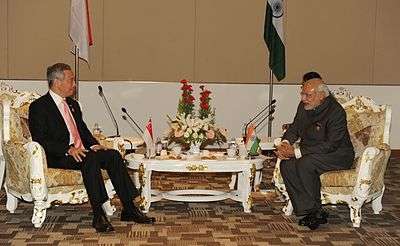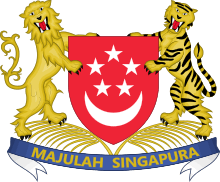India–Singapore relations
 | |
India |
Singapore |
|---|---|

Bilateral relations between the Republic of India and the Republic of Singapore have traditionally been strong and friendly, with the two nations enjoying extensive cultural and commercial relations. India and Singapore have signed the Comprehensive Economic Cooperation Agreement (CECA) and strategic-relationship agreement in order to increase trade, investments and economic cooperation, and expanded bilateral cooperation on maritime security, training forces, joint naval exercises, developing military technology and fighting terrorism.[1][2][3]
According to a 2010 Gallup poll, 40% of Singaporeans approve of India's leadership, with 23% disapproving and 37% uncertain.[4]
Background
India and Singapore share long-standing cultural, commercial and strategic relations, with Singapore being a part of the "Greater India" cultural and commercial region. More than 300,000 people of Indian origin live in Singapore. Following its independence in 1965, Singapore was concerned with China-backed communist threats as well as domination from Malaysia and Indonesia and sought a close strategic relationship with India, which it saw as a counterbalance to Chinese influence and a partner in achieving regional security.[1] Singapore had always been an important strategic trading post, giving India trade access to the Far East. Although the rival positions of both nations over the Vietnam War and the Cold War caused consternation between India and Singapore, their relationship expanded significantly in the 1990s;[1] Singapore was one of the first to respond to India's "Look East" Policy of expanding its economic, cultural and strategic ties in Southeast Asia to strengthen its standing as a regional power.[1]
Development of bilateral relations
Diplomatic relations between India and Singapore were established on 24 August 1965, fifteen days after the latter became independent.[5] Ever since Singapore's independence, both nations have maintained high-level contacts. Between 1966 and 1971 the Prime Minister of Singapore Lee Kuan Yew visited India three times (1966, 1970 and 1971). The then-Indian Prime Minister Indira Gandhi visited Singapore in 1968, as did Indian leader Morarji Desai.[1] Singapore supported India's bid to become a permanent member of the U.N. Security Council and expand its role and influence in the Association of Southeast Asian Nations (ASEAN). Singapore also supported India in its war against Pakistan in 1965 and the Kashmir conflict.[1]
Military relations between the two nations had been limited due to foreign policy differences in the Cold War era,[1] as Singapore was allied with Nato, whilst India established itself as a founding member of the Non-Aligned Movement, and as the only South Asian country to recognise the Democratic Republic of Afghanistan.
In 2003, India and Singapore signed a bilateral agreement on expanding military cooperation, conducting joint military training, developing military technology and achieving maritime security.[1] The Singaporean Navy and the Indian Navy have conducted joint naval exercises and training since 1993 such as SIMBEX and MILAN near India's Andaman and Nicobar Islands. India and Singapore have also expanded their cooperation in fighting terrorism.[1]
Over the last two decades, Singapore has positioned itself as the hub of India’s economic, political and strategic relationships in Southeast Asia. When India announced its Look East policy in 1992, Singapore positioned itself as India’s de facto regional sponsor. As Indian Defence Minister Pranab Mukherjee commented in 2006, Singapore has become “the hub of its political, economic and security strategy in the whole of East Asia.” [6]
After the passing of Mr Lee Kuan Yew in 2015, India followed with a weekend of national mourning in memory of the founding father of Singapore, and Prime Minister Narendra Modi visited Singapore in November 2015 reaffirming fifty years of bilateral relations.[7]
Commerce
Singapore is the 8th largest source of investment in India and the largest amongst ASEAN member nations.[1][8] It is also India's 9th biggest trading partner as of 2005-06.[1] Its cumulative investment in India totals USD 3 billion as of 2006 and is expected to rise to US 5 billion by 2010 and US 10 billion by 2015.[1][2][9][10] India's economic liberalisation and its "Look East" policy have led to a major expansion in bilateral trade, which grew from USD 2.2 billion in 2001 to US 9-10 billion in 2006 – a 400% growth in the span of five years – and to USD 50 billion by 2010.[1][2][9] Singapore accounts for 38% of India's trade with ASEAN member nations and 3.4% of its total foreign trade.[1] India’s main exports to Singapore in 2005 included petroleum, gemstones, jewellery, machinery and its imports from Singapore included electronic goods, organic chemicals and metals. More than half of Singapore’s exports to India are "re-exports" – items that had been imported from India.[1][8]
In 2005, both nations signed the Comprehensive Economic Cooperation Agreement (CECA) and have organised the India-Singapore Parliamentary Forum and the Singapore-India Partnership foundation with active support from the Federation of Indian Chambers of Commerce and Industry (FICC), the Confederation of Indian Industry (CII) and the Singapore Business Federation to promote trade, economic development and partnerships.[1][2][8] The CECA eliminated tariff barriers, double taxation, duplicate processes and regulations and provided unhindered access and collaboration between the financial institutions of Singapore and India.[1][2] The CECA also enhanced bilateral collaboration related to education, science and technology, intellectual property, aviation and relaxed visa regulations for Indian professionals in information technology, medicine, engineering and financial fields to emigrate and work in Singapore.[1][2] Singapore has invested in projects to upgrade India's ports, airports and developing information technology parks and a Special Economic Zone (SEZ).[1] India has become Singapore's 4th biggest tourist destination and more than 650,000 Indians visited Singapore in 2006. Both nations have worked to collaborate on aviation, aerospace engineering, space programmes, information technology, biotechnology and energy.[1]
Non-Compliance of CECA by Singapore
Since early 2016 it has come to light that Singapore quietly backtracked on its commitment to CECA and has blocked Indian IT professionals seeking work visas. [11] In response, India has put on hold further liberation of trade agreed under CECA for this flagrant violation by Singapore.
Military cooperation
In 1994, India and Singapore began their annual naval combat exercise, now called "SIMBEX" Several warships from India and Singapore took part in this interoperable combat exercise.[12]
In 2003, India and Singapore signed a Defence Cooperation Agreement, allowing Singapore army and air force to conduct training on Indian soil.[13]
In 2016, India and Singapore signed the agreement for the "strategic relationship" across the board including defence and military, security and intelligence cooperation, political exchanges, enhancing trade and investment, improving financial linkages, improving air connectivity and cooperation in multilateral forums.[3]
On 29 November 2017, the two countries signed a naval cooperation agreement aimed at boosting maritime security, joint exercises and mutual logistics support. The agreement also permits ships of either navy to refuel, restock and, rearm at each other military bases.[14] After signing the agreement, Singapore's Defence Minister Dr. Ng Eng Hen stated, "not only would we be more comfortable, we would encourage the Indian Navy to visit Changi Naval base more often".[15]
The Republic of Singapore Air Force (RSAF) and the Indian Air Force (IAF) regularly conduct joint military training exercises.[16]
India and Singapore also signed the revised Defence Cooperation Agreement to strengthen the existing defence relationship between Indian military and Singapore Armed Forces on 29 November 2017.
See also
References
| Wikimedia Commons has media related to Relations of India and Singapore. |
- 1 2 3 4 5 6 7 8 9 10 11 12 13 14 15 16 17 18 19 20 "IPCS Special Report - India-Singapore Relations" (PDF). Institute of Peace and Conflict Studies. Archived from the original (PDF) on June 11, 2007. Retrieved 2008-06-18.
- 1 2 3 4 5 6 "India, Singapore ink pact". Asia Times. 2005-07-02. Retrieved 2008-06-18.
- 1 2 []http://www.straitstimes.com/singapore/singapore-india-elevate-ties-to-strategic-partnership-with-signing-of-key-agreements Singapore, India elevate ties to 'strategic partnership' with signing of key agreements]
- ↑ U.S. Leadership More Popular in Asia Than China's, India's Gallup
- ↑ "DIPLOMATIC & CONSULAR LIST" (PDF). MINISTRY OF FOREIGN AFFAIRS. 17 April 2017. p. 103. Retrieved 17 April 2017.
- ↑ David Brewster. "India's Defence Strategy and the India-ASEAN Relationship. Retrieved 24 August 2014".
- ↑ "The Straits Times - Modi tours engineering hubs at ITE campus". Government of Singapore. Archived from the original on 26 November 2015. Retrieved 25 November 2015.
- 1 2 3 "India-Singapore Economic and Commercial Relations". Federation of Indian Chambers of Commerce and Industry. Archived from the original on 11 June 2008. Retrieved 18 June 2008.
- 1 2 "India, Singapore trade to touch $50 bn by 2010". The Hindu Business Line. 2005-06-30. Retrieved 2008-06-18.
- ↑ https://web.archive.org/web/20070606205724/http://www.ipcs.org/IPCS-Special-Report-41.pdf
- ↑ http://timesofindia.indiatimes.com/business/international-business/singapore-blocks-visas-for-indian-it-professionals/articleshow/57981840.cms
- ↑ India, Singapore kick off major naval exercise in South China Sea
- ↑ Singapore, India elevate ties to 'strategic partnership' with signing of key agreements
- ↑ "Eye on China: India and Singapore ink naval pact - Times of India". The Times of India. Retrieved 29 November 2017.
- ↑ "India's Warships Can Now Refuel And Rearm At Singapore Naval Base". NDTV.com. Retrieved 29 November 2017.
- ↑ https://www.channelnewsasia.com/news/singapore/rsaf-gets-immeasurable-value-training-with-indian-air-force-ng-9448722

